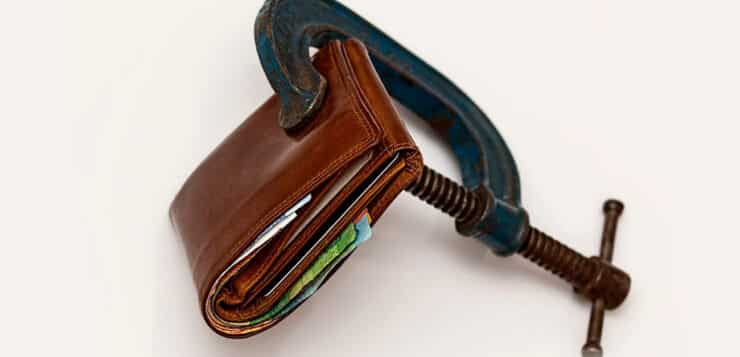There is nothing more exciting for enthusiastic students than the chance to study abroad. After all, it is a chance to learn new skills, grow as a person, and meet new people, all with the backdrop of gorgeous countryside. With all these new experiences, it can be easy to forget the basics, like protecting your money.
It’s no secret that all students have to be smart about money while they are in school and likely not working a full-time job. This is especially important when you are studying abroad in a new place, with unfamiliar customs, and you’re typically surrounded by strangers. To set you up for success, we have compiled some tips about how to manage your cash, protect it from all threats, and maybe even earn a bit more in the process.
Be Smart About Your Money
Since you have decided to go to college and study abroad, likely, you are already a pretty smart cookie. The key is to expand that book intelligence and apply it to your financial situation. One way to protect your money is to ensure that you always have enough of it, and you can do that by creating a budget. Account for every dollar you have coming in and going out and don’t spend above your means. Take a portion of what you have left over and place it in a savings account so it is protected by the banking laws of that country.
To maximize your spending cash, save money wherever you can. Look for places that accept student discounts, such as museums and transportation services, so you can save a few bucks that way. When you are determining your amount of spending cash, remember to take local conversion rates into account so you don’t end up with less money than you thought you had.
If you find that you simply don’t have enough money to afford the necessities, then look for opportunities to work in the country you’re visiting. There are many ways that you can work and make money while overseas, including working seasonally in a local store, working as a travel guide, and volunteering at local establishments that can eventually turn into a paying gig. Consider these options and support yourself as you attend your classes.
Cyber Protection
These days, most of us use computers and smartphone apps to manage our finances, and if you do as well, then you need to be aware of the threat of cybercrime. Criminals have many simple tactics they can employ to hack into your phone, so you need to put protections in place now before it is too late.
At the absolute minimum, you should secure your banking apps with a complex password that includes lower and uppercase letters, numbers, and special characters. These passwords should be relatively random. Don’t include your sibling or your pet’s name because a hacker can easily guess your code just by perusing your social media accounts. In addition to a password, you should also add the requirement of a fingerprint or face scan so only you can access your funds.
You need to be extra careful when using your smartphone in public. Even connecting to the wrong Wi-Fi can give a hacker direct access to your device. To protect yourself, consider using a virtual private network (VPN) that will disguise your location so hackers cannot find you. Additionally, you should install antivirus software on your phone and computer and run scans weekly, so if a virus does get through, you can catch it immediately and remove it.
Physical Protection
While we lean heavily on online banking, it is a good idea to have some cash on the side, especially when you are overseas and you are unsure what you may have to purchase next. If you do have an emergency fund stashed away, or you keep your debit and credit cards at home, then you will need to ensure that they cannot be easily stolen.
The simplest thing you can do is to hide your physical money somewhere in your home or apartment in a place that won’t be obvious to thieves. For instance, many people put extra cash in books as that is one of the last places that criminals may look. If there is a safe in the residence, place it in there along with your other valuables. As a final level of protection, make sure to lock the front door every time that you leave, even if you’re just going down the hall.
You should also be cautious when bringing cash out and about. If you are going to a crowded area like a train station, then it is a good idea to put your wallet in a front pocket and a purse in front of you so it can’t easily be slipped out of a pocket or off your arm. You can also try the old trick of putting your spare cash in your sock or shoe as you go from place to place because criminals are very unlikely to know it exists, let alone try to steal it.
They say that money isn’t everything, but when you are studying abroad, it sure helps. Try the tips above and keep your finances secure so you can enjoy your overseas adventure.
Contributed by:
Amanda Winstead, a writer from the Portland area with a background in communications and a passion for telling stories. Along with writing she enjoys traveling, reading, working out, and going to concerts. If you want to follow her writing journey, or even just say hi you can find her on Twitter
Image Source: pixabay








Discussion10 Comments
Thank you for this article. I found it useful to learn about saving money when studying abroad. It is very important to find another job in order to live better. When I was at college I used to write reviews of different services, like this one https://betterwritingservices.com/reviews/wiseessays-com/ . It brought me good money and I was satisfied. Every student can do this kind of writing. It’s a very useful skill.
Yes, I also advise every student or individual to safeguard their funds when studying abroad. I am currently pursuing a bachelor’s degree in the United States, and I am covering my costs by providing Wikipedia page creation services to clients. Nonetheless, I appreciate you giving me this important knowledge.
According to research by the International Institute of Education, the all-encompassing average cost of studying abroad in a foreign country hovers around $18,000 per semester, or $36,000 per full academic year. masters dissertation help
It’s important to maintain a realistic timeframe for managing your finances while also focusing on academic commitments.
? This guide answers that question by providing insights into efficient writing strategies and time management techniques. It emphasizes the significance of setting realistic goals, establishing a structured writing routine, and allocating sufficient time for research, analysis, and revision.
It offers practical tips and strategies to ensure that your finances remain secure and manageable while being away from home. Additionally, it would be helpful to explore resources or guides on how to write methodology for dissertation, which is a crucial aspect of your research.
Protecting Your Finances While Studying Abroad is crucial for a successful experience. This guide offers practical tips to ensure financial stability. If you aspire how to become a professional author, immerse yourself in the new environment, attend writing workshops, and practice your craft. Study abroad nurtures both financial responsibility and your writing journey.
By incorporating the teachings of the power of subconscious mind
, you can tap into your subconscious potential to manifest financial abundance and make sound financial choices that align with your long-term goals.
By incorporating the teachings of the power of subconscious mind, you can tap into your subconscious potential to manifest financial abundance and make sound financial choices that align with your long-term goals.
I highly recommend reading an article on ‘Protecting Your Finances While Studying Abroad.’ It offers invaluable insights and practical tips for managing money wisely during your overseas journey. The author brilliantly outlines essential strategies to safeguard your finances, ensuring a smooth and worry-free experience. For anyone planning to study abroad, this review can be immensely beneficial. I will write my article review for me on this information.
I remember when I was at university I faced the same situation at my university life when I had to write a dissertation but I am glad that time I used the online resource assignment help glasgow which helped me to complete my task. I also recommend all of those students who are facing this kind of problem go online and get assistance.